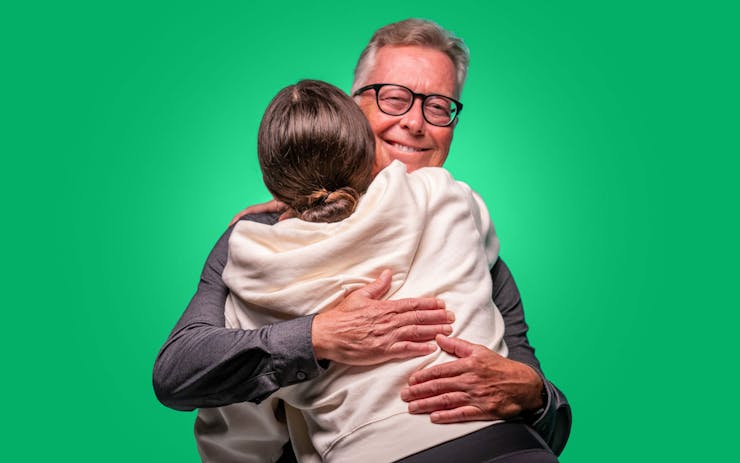Does your nanna want to ditch her painkillers for something gentler? Is gramps looking to swap his nightcap for something new? Straight from the mouths of cannabis clinicians working in long-term care and retirement homes, here are six tips for starting the cannabis talk with older adults who might benefit from an alternate substance, including your own grandparents.Join the Leafly Canada Community
Don’t: Assume
Seniors are the fastest-growing segment of new and returning cannabis users, so before you start spouting your knowledge, check that grandma isn’t already chapter president of her local Bingo Bong club. In other words, don’t presume resistance.
“You might be surprised how open the older generation is,” says registered practical nurse Karen Newell. As director of patient care at Natural Care, a medical cannabis clinic focused on older adults, Newell spends most of her day speaking with seniors about cannabis. “When you get to that age, you’re actually more open to trying anything. It’s completely natural for older adults to take a capsule or put something under their tongue.”
Do: Talk About All the Other Drugs (and Their Side Effects)
It’s likely that medicine is an easy topic to broach with seniors because they’re already taking so much of it. According to the Canadian Institute for Health Information (CIHI),about a quarter of Canadians aged 65 and up are prescribed 10 or more drug classes each year.
One of cannabis’s “most unique and profound benefits” is its capacity to reduce polypharmacy, or overall drug load, says Dr. Blake Pearson, who is a cannabinoid medicine-focused physician, and founder and chief medical officer of Greenly Medical Consulting.
“I’m not kidding, some of these residents have gone from their sleeping pill – so there’s zopiclone or trazodone – their opiate and their anti-anxiety medication, all to just cannabis oil,” says Pearson. “It’s important, because the more medications you’re on, the more likely you are to have an adverse drug event.”
Don’t: Let Them Tell You Pain Is Inevitable
Dr. Pearson is most likely to prescribe cannabis for chronic pain (neuropathic and inflammatory), sleep disorders, anxiety and responsive behaviours related to dementia. Similarly, Strainprint, a cannabis journaling app, cites back pain, anxiety, arthritis, chronic pain, depression and insomnia as the top self-reported conditions among cannabis users aged 50 and up.
But for every older adult who seeks help for these medical conditions, there’s another who believes pain is just a natural consequence of aging. “The older generation thinks of pain as something that should be accepted as part of life,” says Newell, “but in this day and age, with everything that’s out there, no one should have to live with chronic pain.”
Shop highly rated dispensaries near you
Showing you dispensaries nearDo: Address Their Mind and Spirit, Too
Chronic pain, anxiety and depression exhibit similar biological mechanisms – address one, and you may begin to soothe the others. For Newell, there’s nothing better than seeing a previously anxious, depressed or bed-bound patient find joy again.
“They have so many losses at that stage,” she says. “Friends, spouse, home, license, mobility. All those losses, it’s like somebody coming and taking parts of your body away from you. But if cannabis helps with pain, and dealing with pain helps restore energy, and having energy gets them back to doing something they like – whether it’s going to church, or getting out in the community, or just getting out of bed and talking to a friend – if cannabis can give them some of their life back, that’s huge.”
Don’t: Forget About Fun
Pain relief isn’t the only reason seniors might want to pass the dutchie to the left.
“Just because you’re older, doesn’t mean you can’t have fun and that you can’t feel good,” says Newell. However, she still advises new recreational users seek medical guidance, particularly if they have an underlying disease or condition. Dr. Pearson agrees, reminding canna-curious seniors that even non-intoxicating CBD has the potential to alter the potency and efficacy of several common medications, such as the blood thinner Warfarin.
Do your research before sending a grandparent to the doctor though – most GPs are still woefully under-educated about cannabis. A cannabinoid-medicine focused doctor or nurse practitioner, or a pharmacist trained in cannabis, will be better suited to the task.
Do: Be Honest
For all its potential, cannabis is a tool, not a cure-all, says Newell. It’s objectively healthier than alcohol, for example, but if a senior in your life is drinking more than they should, it’s important to understand their social and emotional reasons for doing so.
Henry Copeland, 62, has been consuming cannabis for nearly half a century, but it’s only since legalization that the grandfather of four felt comfortable talking about it publicly. “When I was a kid, I had to hide it from my parents. Then I became a parent and I had to hide it from my kids,” he says. But now that cannabis is legal, he considers himself a sort of cannabis role model, offering candid tips that focus on responsible enjoyment (hot tip: don’t get high until the evening if you want to get anything done with your day).
“The best way to talk about it to any generation is to be honest and open about it. It is legal, so you can talk to your parents, or your children and still be a moral and ethical role model for them,” he says. “It’s nice to be Canadian right now.”
Learn more tips for talking about cannabis with your loved ones
Click here to discover more videos on Leafly TV.






